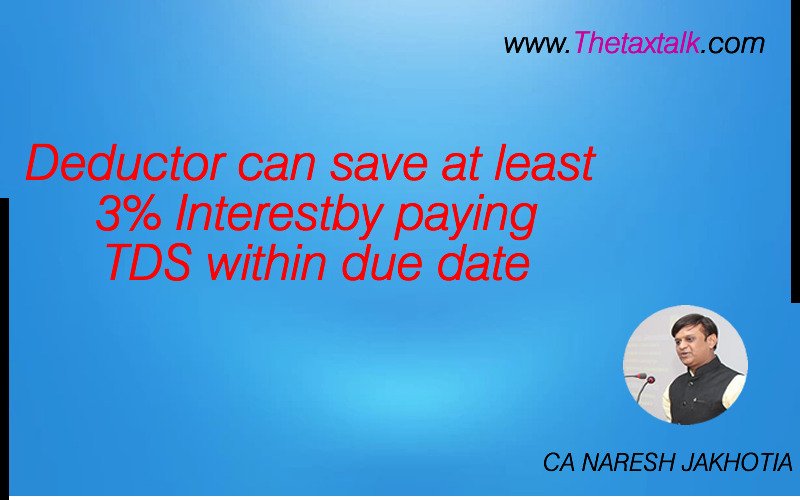![]()
Deductor can save at least 3% Interest by paying TDS within due date
“You must pay taxes. But there’s no law that says you gotta leave a tip.” – Morgan Stanley
Law and logic are often strangers. There are various provisions in the income tax law which defies logic, results in funny but painful consequences. Let me discuss one such instance in this issue of The Tax Talk. Taxpayers may be surprised if someone says that a delay of one day in payment of TDS may make them pay interest of 3%. Unreasonable it may sound, but this is what the income tax law provides. Let us try to know about it:
1. 0 Section 201 govern the levy of interest in case of default in payment of Tax at Source (TDS) amount and it provides for charging of interest @ 1.50% for “month” or “part of the month” in case the deductor, after deduction, fails to make the payment to the Government Treasury within the due date.
2. Due Date:
The Deductor is required to make the payment of TDS within 7 days from the end of the month in which TDS is done (Only exception is the TDS for the month of March). For example, if TDS is done on 28.09.2021 (in September 2021) then the TDS amount is required to be paid by the deductor to the Government Treasury on or before 7th October 2021. If the TDS is deposited on or before 7th October 2021, no interest liability would be there. However, if there is a delay in payment, say the TDS is deposited by the deductor on 8th October, then interest u/s 201would be applicable. In such a scenario, interest is payable @ 1.50% for a month or a part of the month.
3. In short, there is no concept of payment of interest on a day-wise basis for a day or two or so on. The prescribed interest percentage is applicable even to the “part of a month”. In the above example, logically interest should have been levied for one day as the TDS amount was paid on 8th October instead of 7th October. However, since the interest rate of 1.50% is provided for “part of a month”, single day delay would be reckoned as “part of a month” & would attract an interest rate of 1.50%.
At the cost of repetition, it must be noted that section 201 doesn’t provide an interest rate of 1.50% per month but provides for interest of 1.50% for a “month” or a “part of a month”. Every word counts in the law and it plays an important role in the interpretation of the provision.
4. Now, comes to the interesting part of section 201. It says that interest is enviable from the date on which TDS is done to the date on which TDS is deposited. Obviously, in the present case, the deductor has done the TDS on 28th September 2021 and so interest is leviable from 28th September. 3 days of September (28th, 29th & 30th September) will be treated as “part of a month” and so the interest would be applicable for the entire September month. Since the payment is done on 8th October, interest would be applicable for the entire month of October as interest rate of 1.50% is provided for “part of a month” here also.
5. Factually, there is a delay of just one day from the educator’s perspective. Interest should have been levied for one single day as 7 days time-frame is allowed by the Government for payment of TDS. If the deductor has failed to make the payment within the allotted time period of 7 days for any reason whatsoever and if the amount is deposited on 8th October, interest should have been collected for one day only.
6. In the above example, the deductor has done the TDS on 28th September and has deposited the amount on 8th October. Effectively, the TDS amount was retained by the deductor for 10 days only. But, strict interpretation of section 201 provides that the TDS will be applicable for two months i.e., month of September 2021 & October 2021 also. It means that total interest would be 3% of the TDS amount. Levy of interest of 3% for keeping the TDS amount for just 10 days may sound shocking & unreasonable. However, this is the way the law works.
7. The deductor has to be very careful and cautious as far as the deposit of the TDS amount is concerned and should pay the TDS amount well before the due date so as to avoid the application of interest at such a higher rate.
8. There are enough provisions in the Income Tax law to discourage the practice of non compliance with the TDS provision. Levy of interest is a mode to compensate the treasury for the loss of interest. But interest provision must provide for the levy of interest for default/delay on actual basis and not the way it has been going on now. Further, TDS is an onerous duty casted on the deductor. It’s a thankless job from the angel of the deductor. Levying interest at such a higher rate of 3% in such a situation where annual borrowing cost ranges in between 7% to 9% is too ridiculous.
9. The illogical law affects all. Drafting of law plays an important role in its implementation and even a slight error may carry hefty financial consequences for the taxpayers. One cannot rule out the error in the drafting of the law but correction and rectification has to be the part and parcel of the law implementation.


